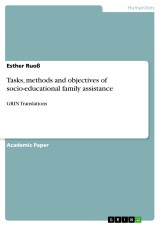Details

Tasks, methods and objectives of socio-educational family assistance
GRIN Translations1. Auflage
|
15,99 € |
|
| Verlag: | Grin Verlag |
| Format: | |
| Veröffentl.: | 12.04.2024 |
| ISBN/EAN: | 9783389011492 |
| Sprache: | englisch |
| Anzahl Seiten: | 30 |
Dieses eBook enthält ein Wasserzeichen.
Beschreibungen
Academic Paper from the year 2007 in the subject Social Work, grade: 1,3, Protestant University of Applied Sciences Ludwigsburg, language: English, abstract: This text was translated with the help of AI and reviewed by the GRIN editorial team.
During my second internship semester, I was able to familiarise myself with the work of Sozialpädagogische Familienhilfe (SPFH). SPFH is a very varied and interesting field of work and, in my opinion, has a very good starting point for socio-pedagogical work in educational support because it involves the whole family - parents and children alike. SPFH works with families who usually have to deal with several difficulties and problems at the same time - in the language of resilience research, these are families with multiple risk burdens. Children from such families must have a high level of resilience in order to be able to develop normally despite the adverse circumstances.
The SPFH in Germany had its beginning in the 60s in Berlin. Out of an emergency situation – at that time all homes were overcrowded – the then Berlin home manager of all state children's homes – Martin Bonhoeffer – had the idea of having five children who needed temporary care, instead of in the home, cared for by an unemployed friend in the children's apartment. At that time, however, this was not approved by the responsible district office. In 1969, Bonhoeffer's idea was followed by a group of educators, social workers, sociologists and pedagogues who founded the association "Berliner Gesellschaft für Heimerziehung e.V." and whose aim was to develop new educational concepts and strategies.
Bonhoeffer's group developed his idea of an alternative to external accommodation and so, for the first time, five children whose mother had to go to the hospital could be cared for at home instead of in the home. Due to this successful first mission, further deployments of the family assistance offer could be carried out. The beginnings of the SPFH therefore lie in family care, in order to continue to ensure the care of the children and the housekeeping in the absence of the mother or the main care person. Even today, the SPFH is sometimes still confused with family care.
During my second internship semester, I was able to familiarise myself with the work of Sozialpädagogische Familienhilfe (SPFH). SPFH is a very varied and interesting field of work and, in my opinion, has a very good starting point for socio-pedagogical work in educational support because it involves the whole family - parents and children alike. SPFH works with families who usually have to deal with several difficulties and problems at the same time - in the language of resilience research, these are families with multiple risk burdens. Children from such families must have a high level of resilience in order to be able to develop normally despite the adverse circumstances.
The SPFH in Germany had its beginning in the 60s in Berlin. Out of an emergency situation – at that time all homes were overcrowded – the then Berlin home manager of all state children's homes – Martin Bonhoeffer – had the idea of having five children who needed temporary care, instead of in the home, cared for by an unemployed friend in the children's apartment. At that time, however, this was not approved by the responsible district office. In 1969, Bonhoeffer's idea was followed by a group of educators, social workers, sociologists and pedagogues who founded the association "Berliner Gesellschaft für Heimerziehung e.V." and whose aim was to develop new educational concepts and strategies.
Bonhoeffer's group developed his idea of an alternative to external accommodation and so, for the first time, five children whose mother had to go to the hospital could be cared for at home instead of in the home. Due to this successful first mission, further deployments of the family assistance offer could be carried out. The beginnings of the SPFH therefore lie in family care, in order to continue to ensure the care of the children and the housekeeping in the absence of the mother or the main care person. Even today, the SPFH is sometimes still confused with family care.
Diese Produkte könnten Sie auch interessieren:

Professionelle Kommunikation, Mediation und Beratung in der sozialen Arbeit

von: Anne Horrick

15,99 €

Psychosoziale Auswirkungen nächtlicher Inkontinenz für eine Klientin in einem Wohnheim für behinderte Menschen

von: Gunnar Schulze

13,99 €













